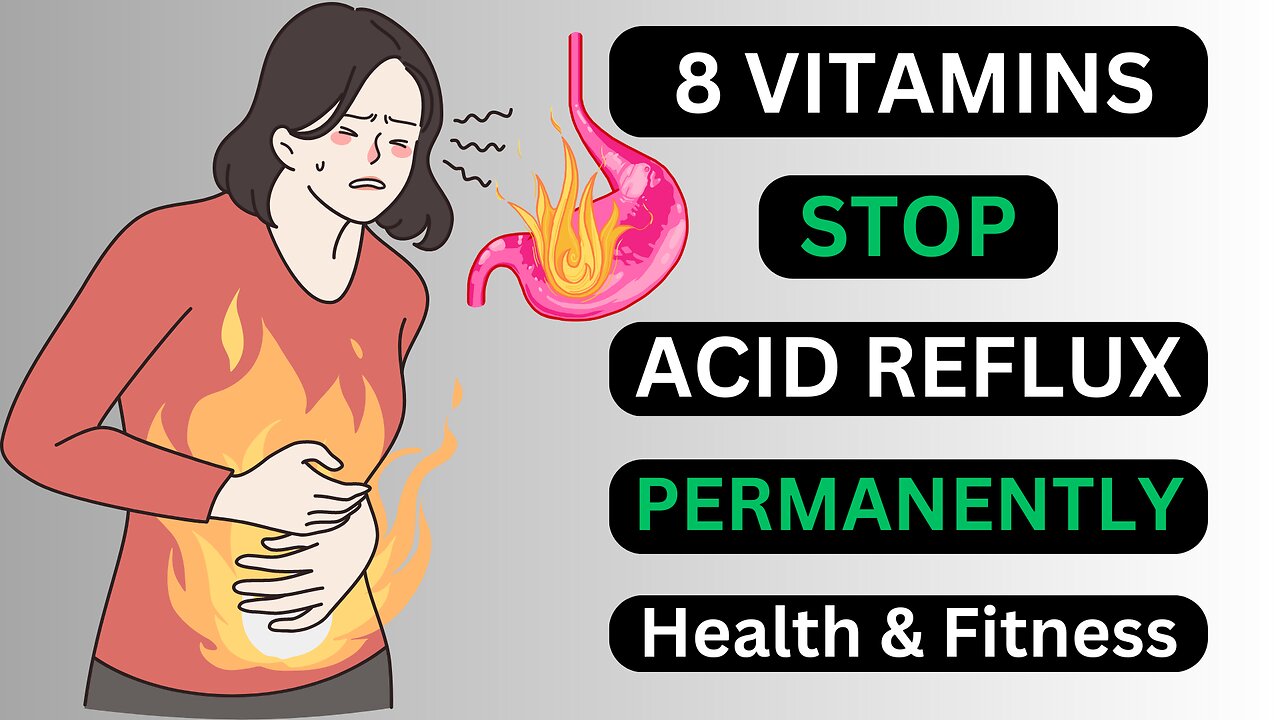Premium Only Content

8 Vitamins to stop acid reflux permanently
8 Vitamins to stop acid reflux permanently
I must clarify that while certain vitamins and nutrients can help manage acid reflux symptoms, there is no single solution to permanently stop acid reflux. Acid reflux, also known as gastroesophageal reflux disease (GERD), is a chronic condition that may require medical intervention and lifestyle changes for effective management. Always consult with a healthcare professional for personalized advice on managing your acid reflux.
Click the link button product
http://bitly.ws/LYfL
That said, here are eight vitamins and nutrients that may help alleviate acid reflux symptoms:
Vitamin A: This vitamin supports the health of the mucous membranes in the gastrointestinal tract, which can help protect the esophagus from damage caused by stomach acid.
Vitamin B-6: It plays a role in improving the function of the lower esophageal sphincter (LES), a muscular valve that helps prevent stomach acid from flowing back into the esophagus.
Vitamin B-12: Some acid reflux medications, like proton pump inhibitors (PPIs), can lead to vitamin B-12 deficiency. Ensuring an adequate intake of this vitamin is essential for overall digestive health.
Vitamin D: Vitamin D may help strengthen the muscles of the esophagus and LES, potentially reducing the frequency of acid reflux episodes.
Vitamin E: As an antioxidant, vitamin E can promote healing and protect the esophageal lining from inflammation caused by stomach acid.
Calcium: This mineral can aid in maintaining proper LES function and help regulate stomach acid levels.
Magnesium: Some research suggests that magnesium supplementation might improve LES function and reduce symptoms of acid reflux.
Melatonin: While not a vitamin, melatonin is a hormone that regulates sleep patterns. It may also help reduce acid production and improve LES function.
Remember, vitamins alone cannot cure acid reflux, but incorporating a well-balanced diet rich in these nutrients may help in managing symptoms. Alongside dietary changes, it's important to adopt lifestyle modifications such as avoiding trigger foods, maintaining a healthy weight, not eating close to bedtime, and elevating the head of your bed to reduce nighttime reflux.
If you're experiencing persistent acid reflux symptoms, seek guidance from a healthcare professional to determine the best approach for your specific situation. They can recommend appropriate treatments and lifestyle changes tailored to your needs.
-
 1:00:37
1:00:37
Adam Does Movies
5 hours ago $3.53 earnedBatman II Update + Flash Director Fails + Movie Bombs! - LIVE!
40.5K5 -
 2:26:24
2:26:24
We Like Shooting
19 hours ago $1.18 earnedWe Like Shooting 593 (Gun Podcast)
27.3K -
 57:03
57:03
Flyover Conservatives
1 day agoJack Hibbs Blasts California Leaders: Must-Watch!; Can Trump Fix the Mess? How Long will it Take? - Dr. Kirk Elliott | FOC Show
51.1K7 -
 2:00:50
2:00:50
DillyDillerson
5 hours agoTalking to the moon!! Just some live views of the FULL MOON!!
32.2K11 -
 1:29:29
1:29:29
Glenn Greenwald
10 hours agoWith Biden Out, U.S. Finally Admits Harms of His Israel / Gaza Policy; Biden Pays Homage To George W. Bush; Insane Women’s Tennis Scandal: An “Abusive” Coach | SYSTEM UPDATE #388
67.6K88 -
 3:12:23
3:12:23
Danny Polishchuk
12 hours agoWho's To Blame For LA Fires, Jewish Tunnels Update + Forbidden Anthropology
29.7K5 -
 1:08:10
1:08:10
Donald Trump Jr.
12 hours agoOne Week Until Inauguration, Live with Rep Anna Paulina Luna & Sen Tommy Tuberville
130K201 -
 1:00:13
1:00:13
The StoneZONE with Roger Stone
8 hours agoLAWFARE! Are Trump's Legal Assaults Winding Down? w/ Impeachment Lawyer David Schoen | The StoneZONE
38.7K -
 1:01:43
1:01:43
Patriots With Grit
1 day agoShocking Changes Are Coming-7 ‘Mission Critical’ Steps Soon To Be Released That Will Leave You Speechless! | John Richardson
18.7K1 -
 8:00:59
8:00:59
Dr Disrespect
15 hours ago🔴LIVE - DR DISRESPECT - MARVEL RIVALS - TOP 500 IN THE WORLD
158K30